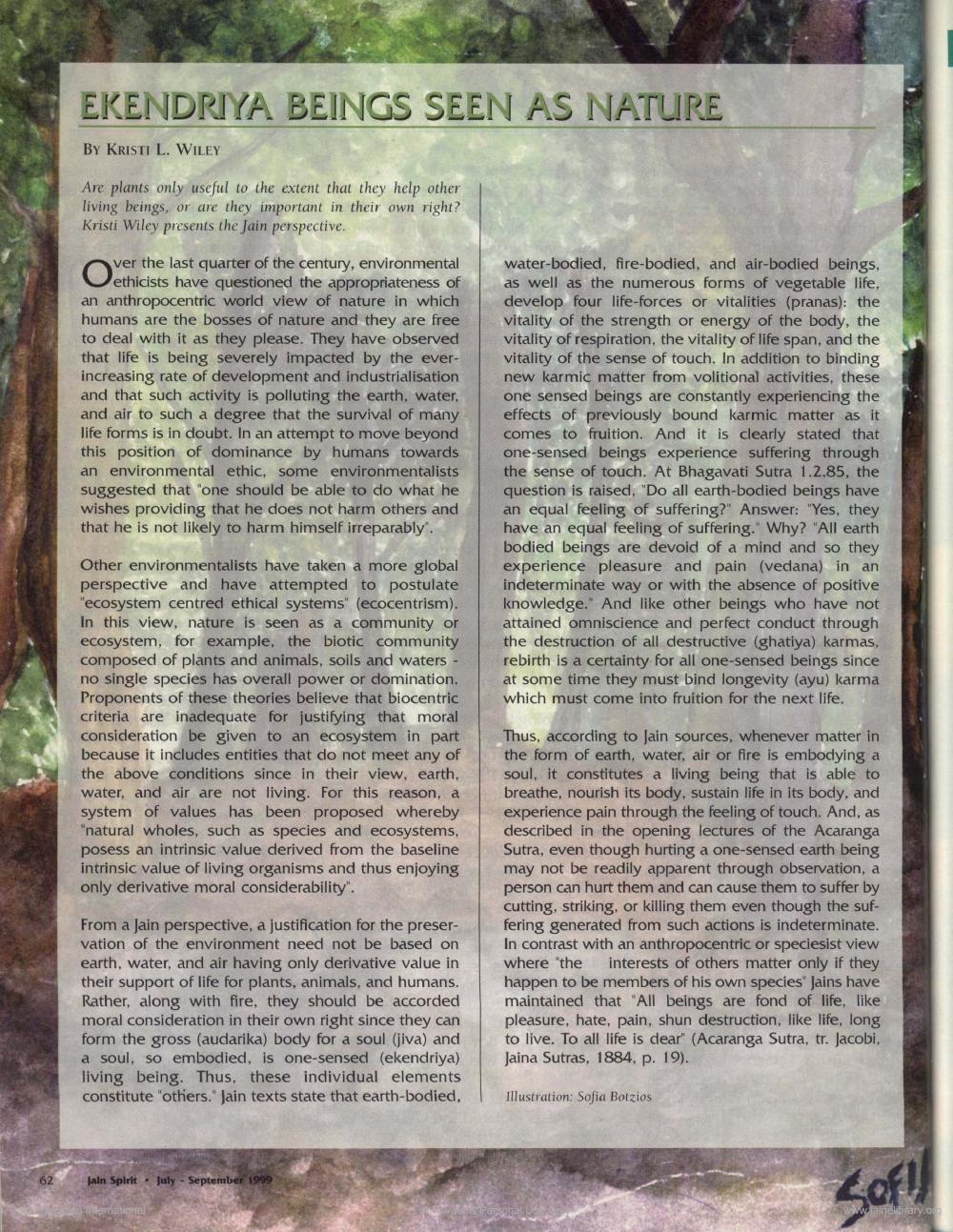________________
EKENDRIYA BEINGS SEEN AS NATURE
BY KRISTI L. WILEY
Are plants only useful to the extent that they help other living beings, or are they important in their own right? Kristi Wiley presents the Jain perspective.
over the last quarter of the century, environmental
ethicists have questioned the appropriateness of an anthropocentric world view of nature in which humans are the bosses of nature and they are free to deal with it as they please. They have observed that life is being severely impacted by the everincreasing rate of development and industrialisation and that such activity is polluting the earth, water, and air to such a degree that the survival of many life forms is in doubt. In an attempt to move beyond this position of dominance by humans towards an environmental ethic, some environmentalists suggested that one should be able to do what he wishes providing that he does not harm others and that he is not likely to harm himself irreparably.
water-bodied, fire-bodied, and air-bodied beings, as well as the numerous forms of vegetable life, develop four life-forces or vitalities (pranas): the vitality of the strength or energy of the body, the vitality of respiration, the vitality of life span, and the vitality of the sense of touch. In addition to binding new karmic matter from volitional activities, these one sensed beings are constantly experiencing the effects of previously bound karmic matter as it comes to fruition. And it is clearly stated that one-sensed beings experience suffering through the sense of touch. At Bhagavati Sutra 1.2.85, the question is raised, "Do all earth-bodied beings have an equal feeling of suffering?" Answer: "Yes, they have an equal feeling of suffering. Why? "All earth bodied beings are devoid of a mind and so they experience pleasure and pain (vedana) in an indeterminate way or with the absence of positive knowledge. And like other beings who have not attained omniscience and perfect conduct through the destruction of all destructive (ghatiya) karmas, rebirth is a certainty for all one-sensed beings since at some time they must bind longevity (ayu) karma which must come into fruition for the next life.
Other environmentalists have taken a more global perspective and have attempted to postulate "ecosystem centred ethical systems" (ecocentrism). In this view, nature is seen as a community or ecosystem, for example, the biotic community composed of plants and animals, soils and waters - no single species has overall power or domination. Proponents of these theories believe that biocentric criteria are inadequate for justifying that moral consideration be given to an ecosystem in part because it includes entities that do not meet any of the above conditions since in their view, earth. water, and air are not living. For this reason, a system of values has been proposed whereby "natural wholes, such as species and ecosystems, posess an intrinsic value derived from the baseline intrinsic value of living organisms and thus enjoying only derivative moral considerability".
Thus, according to Jain sources, whenever matter in the form of earth, water, air or fire is embodying a soul, it constitutes a living being that is able to breathe, nourish its body, sustain life in its body, and experience pain through the feeling of touch. And, as described in the opening lectures of the Acaranga Sutra, even though hurting a one-sensed earth being may not be readily apparent through observation, a person can hurt them and can cause them to suffer by cutting, striking, or killing them even though the suffering generated from such actions is indeterminate. In contrast with an anthropocentric or speciesist view where the interests of others matter only if they happen to be members of his own species Jains have maintained that "All beings are fond of life, like pleasure, hate, pain, shun destruction, like life, long to live. To all life is dear" (Acaranga Sutra, tr. Jacobi, Jaina Sutras, 1884, p. 19).
From a Jain perspective, a justification for the preservation of the environment need not be based on earth, water, and air having only derivative value in their support of life for plants, animals, and humans. Rather, along with fire, they should be accorded moral consideration in their own right since they can form the gross (audarika) body for a soul (jiva) and a soul, so embodied, is one-sensed (ekendriya) living being. Thus, these individual elements constitute "others." Jain texts state that earth-bodied,
Illustration: Sofia Botzios
62
Jain Spirit. July - September 1999
mine
wametuary.org




